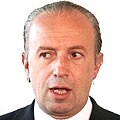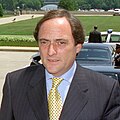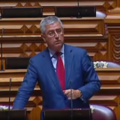| Office | Minister | Party | Start of term | End of term |
|---|
| Prime Minister |  | Pedro Santana Lopes | | PSD | 17 July 2004 | 12 March 2005 |
| Minister of State, Economic Activities and Labour | Álvaro Barreto | | PSD | 17 July 2004 | 12 March 2005 |
| Minister of State, National Defense and Sea Affairs |  | Paulo Portas | | CDS–PP | 17 July 2004 | 12 March 2005 |
| Minister of State and Presidency | Nuno Morais Sarmento | | PSD | 17 July 2004 | 12 March 2005 |
| Minister of Finance and Public Administration |  | António Bagão Félix | | Independent | 17 July 2004 | 12 March 2005 |
| Minister of Foreign Affairs and Portuguese Communities |  | António Monteiro | | Independent | 17 July 2004 | 12 March 2005 |
| Minister of Internal Administration | Daniel Sanches | | Independent | 17 July 2004 | 12 March 2005 |
| Minister of Justice |  | José Pedro Aguiar-Branco | | PSD | 17 July 2004 | 12 March 2005 |
| Minister of Cities, Local Administration, Housing and Regional Development | José Luís Arnaut | | PSD | 17 July 2004 | 12 March 2005 |
| Minister of Agriculture, Fisheries and Forests | Carlos Costa Neves | | PSD | 17 July 2004 | 12 March 2005 |
| Minister of Education | Maria do Carmo Seabra | | Independent | 17 July 2004 | 12 March 2005 |
| Minister of Science and Higher Education |  | Graça Carvalho | | PSD | 17 July 2004 | 12 March 2005 |
| Minister of Health | Luís Filipe Pereira | | PSD | 17 July 2004 | 12 March 2005 |
| Minister of Social Security, Family and Children |  | Fernando Negrão | | PSD | 17 July 2004 | 12 March 2005 |
| Minister of Public Works, Transportation and Communications | António Mexia | | Independent | 17 July 2004 | 12 March 2005 |
| Minister of Culture | Maria João Bustorff | | Independent | 17 July 2004 | 12 March 2005 |
| Minister of the Environment and Territorial Planning | Luís Nobre Guedes | | CDS–PP | 17 July 2004 | 12 March 2005 |
| Minister of Tourism | Telmo Correia | | CDS–PP | 17 July 2004 | 12 March 2005 |
| Minister of Youth, Sports and Rehabilitation | Henrique Chaves | | PSD | 24 November 2004 | 2 December 2004 |
| Assistant Minister to the Prime Minister (Ministro Adjunto do Primeiro-Ministro) | Henrique Chaves | | PSD | 17 July 2004 | 24 November 2004 |
| Rui Gomes da Silva | | PSD | 24 November 2004 | 12 March 2005 |
| Minister of Parliamentary Affairs | Rui Gomes da Silva | | PSD | 17 July 2004 | 24 November 2004 |







